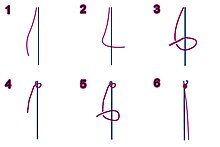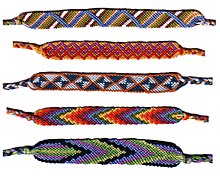Friendship bracelet


A friendship bracelet is a decorative bracelet given by one person to another as a symbol of friendship. Friendship bracelets are often handmade, usually of embroidery floss or thread and are a type of macramé. There are various styles and patterns, but most are based on the same simple half-hitch knot. They resemble a friendship that is strong and everlasting.
The amount of thread used in bracelets varies depending on the pattern. The smallest pattern, a double chain knot, requires two strings while the candy stripe can have three or more strings depending on the desired thickness.
Friendship bracelets first became popular in the United States during the 1970s. As they are unisex, they are commonly worn by both male and female teenagers and children.[1] They are now popular throughout the world[2][3][4] and are not only popular among teenagers but among the older generation; they are popular among celebrities as well[who?]. Friendship bracelets can be worn on various occasions; for example, they are ideal as a fashion accessory at the beach because they are made of materials that will not be easily destroyed and with which one can swim freely.[5]
History
Friendship bracelets are ancient,[citation needed] but their resurgence is modern. The modern popularity of friendship bracelets started in the 1980s when they were seen during protests about the disappearances of Mayan Indians and peasants in Guatemala.[6] The friendship bracelets were brought into the United States by religious groups for use in political rallies.[6]
Friendship bracelets can have many meanings and symbolic uses, such as friendship, folk art, or social statements.[6] Although it is generally accepted that the origins of these colorful bands lie with the indigenous people of Central and South America, some decorative knots can be traced back to China from 481 to 221 BC.[7]
Folklore
According to tradition, one ties a bracelet onto the wrist of a friend as a symbol of friendship and may wish for something at that moment. The bracelet should be worn until it is totally worn out and falls off by itself to honour the hard work and love put into making it. The moment at which the band falls off on its own, the wish is supposed to come true.[8]
Missanga
Missanga (from Template:Lang-pt)[citation needed] is an international good luck charm made from knotted embroidery floss, thread or gimp. Similar to friendship bracelets, it is made with basic knots as well as patterning techniques. Its basic structure is a three thread plaited braid. It is becoming a popular portable craft project.
Patterns


There are different types of friendship bracelets for example normal bracelets or alpha bracelets that are tied in different ways. Normal bracelets are tied diagonally while alpha bracelets are tied horizontally.
For each of the different types of friendship bracelets there is a big number of different patterns that get passed on from person to person or can be found in books or on websites. The amount of possible patterns is infinite. Only the most well known and most commonly used ones have names. These names vary slightly depending on location, but are overall similar.
- Alpha bracelets - knots are tied horizontally instead of diagonally, allowing for the creation of letters and symbols
- Name/word bracelets
- Rag rug
- Normal bracelets - knots are tied diagonally
- Other bracelets
- Chinese staircase
- Double chain knot
- Knitted bracelets
- Swirl and braids (a combination of a braid and Chinese staircase)
- Wrapped bracelets
- Zipper bracelets
- Shaped bracelets - bracelets that have edges that aren't straight or that have holes
- Chain bracelets
- Broken ladder (a combination of the chevron and the Chinese staircase)
- Daisy chain
- Totem Pole
- Zolino
- Chain bracelets
See also
References
- ^ Buchanan, Andrea J.; Miriam Peskowitz (2007). The Daring Book for Girls. New York: Collins. p. 99. ISBN 978-0-06-147257-2.
- ^ Robinson, Russell (November 6, 2010). "Weekend: Mums on a mission". Herald Sun.
- ^ Johnson, Dirk (August 13, 1993). "Despite rain, Denver is a mile high for the Pope". Moscow-Pullman Daily News.
- ^ Glascock, Stuart (April 13, 2008). "Dalai Lama draws 65,000 in Seattle". Common Dreams. Archived from the original on October 9, 2012. Retrieved May 28, 2011.
- ^ "Friendship Bracelets and Patterns". Archived from the original on 2013-06-07. Retrieved 7 June 2013.
- ^ a b c Hatfield, Julie Hatfield (May 26, 1988). "Bracelets that Make a Statement". The Boston Globe. HighBeam Research. Archived from the original on June 10, 2014. Retrieved August 27, 2012.
- ^ "History of friendship bracelets". Braceletbook.com.
- ^ Gryski, Camilla (August 1993). Friendship Bracelets. Mulberry Books. p. front inside cover. ISBN 0688124372.
- ^ Torres, Laura (August 1996), Friendship Bracelets, Klutz, ISBN 1-59174-700-7
External links
 Media related to Friendship bracelets at Wikimedia Commons
Media related to Friendship bracelets at Wikimedia Commons
